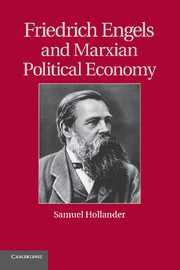Book contents
- Frontmatter
- Contents
- Preface
- Prolegomena
- 1 Engels's Early Contribution
- 2 The Surplus-Value Doctrine, Rodbertus's Charge of Plagiarism, and the Transformation
- 3 Economic Organization, and the Price Mechanism
- 4 “Revisionism” I. Constitutional Reform versus Revolution
- 5 “Revisionism” II. Social Reform
- 6 The Engels–Marx Relation
- 7 A Methodological Overview
- Epilogue: The Immediate Legacy
- Appendix A Prolegomena: A Brief Chronology
- Appendix B Chapter 5
- Appendix C Chapter 7
- Bibliography of Works Cited
- Index
- Titles in the series
4 - “Revisionism” I. Constitutional Reform versus Revolution
Published online by Cambridge University Press: 01 June 2011
- Frontmatter
- Contents
- Preface
- Prolegomena
- 1 Engels's Early Contribution
- 2 The Surplus-Value Doctrine, Rodbertus's Charge of Plagiarism, and the Transformation
- 3 Economic Organization, and the Price Mechanism
- 4 “Revisionism” I. Constitutional Reform versus Revolution
- 5 “Revisionism” II. Social Reform
- 6 The Engels–Marx Relation
- 7 A Methodological Overview
- Epilogue: The Immediate Legacy
- Appendix A Prolegomena: A Brief Chronology
- Appendix B Chapter 5
- Appendix C Chapter 7
- Bibliography of Works Cited
- Index
- Titles in the series
Summary
Introduction
The general context for this chapter was set out in the Prolegomena, and I can proceed to substance. I focus in Section B on The Condition of the Working Class in England (1845), where Engels expresses the likelihood of violent revolution at the next cyclical crisis – notwithstanding an expectation that the Chartists' demands for an extended franchise would be met – with some hope that the communists might restrain the violence. Other statements are ambiguous regarding the manner of achievement of proletarian rule, but by 1847–8 the prospect of a successful constitutional outcome is viewed seriously, while the important Principles of Communism (1847) advises the prospective proletarian majority to undertake the dismantling of the private-property system. The realization of “democracy” by constitutional means had already occurred in the eastern states of the United States, whereas government intransigence rendered the prospect less promising in France.
Much the same picture emerges from Marx's Poverty of Philosophy of 1847, where union activity combined with Chartist political activity is championed; and a Marx paper of October 1847 elaborates the achievement by constitutional means of “political equality” in the eastern United States. The joint Communist Manifesto itself justifies communist support for constitutional reform measures and calls for cooperation between the bourgeoisie and the proletariat.
Section C principally concerns Marx's The Class Struggles in France 1848–1850, which expresses disappointment at the failure of the June 1848 uprising.
- Type
- Chapter
- Information
- Friedrich Engels and Marxian Political Economy , pp. 176 - 228Publisher: Cambridge University PressPrint publication year: 2011

